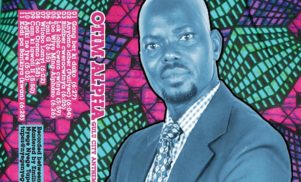Uganda’s Nyege Nyege Tapes is a homegrown label galvanizing the local Kampala scene from the ground up and championing outsider sounds from across Africa and beyond. Three releases in, we’re already hooked. April Clare Welsh talks to the label’s co-founder.
Despite only launching in January, Kampala-based label Nyege Nyege Nyege Tapes has already dropped one of our favorite albums of the year.
Gulu City Anthems comprises eleven hot-footed bangers by Ugandan “electro acholi” originator Otim Alpha that collects 11 years’ of Alpha and producer Leo Palayeng’s unique recordings – a mixture of traditional Acholi ‘Larakaraka’ wedding songs and bubblegum electronics. The dancefloor-ready LP perfectly encapsulates the Nyege Nyege namesake, which roughly translates from the local language of Luganda as “the feeling of a sudden uncontrollable urge to move, shake or dance.”
Alpha’s polyrhythmic wedding jams are just one facet of the region’s growing outsider music scene, a scene that’s rich with artists that neither fit into the commercial mainstream nor adhere strictly to local musical styles or traditions. Through Nyege Nyege Tapes, co-founders Arlen Dilsizian and Derek Debru are giving those artists a vital platform.
Nyege Nyege roughly means “the feeling of a sudden uncontrollable urge to move, shake or dance” in the local language of Luganda
Dilsizian and Debru have been living in the Ugandan capital of Kampala for the past seven years, but started throwing parties in different parts of the city about four years ago. “One thing simply led to the next,” says Dilsizian of the label’s formation.
He continues: “The more we realized there were unknown producers in small, nondescript studios all over Uganda and East Africa making far-out stuff that was only for very localized consumption (were talking not beyond a specific province or tribe) the more we realized there wasn’t really a platform for releasing non-commercial orientated music from East Africa in the region. That was the birth of Nyege Nyege Tapes.”
Both Dilsizian and his label partner have backgrounds in anthropology, film and performance art. Alongside putting out releases, they helm an artist residency program, organize a year-round calendar of music and arts events as Boutiq Electroniq and run a studio that is available free of charge to anyone they feel is producing “interesting music that is not commercially orientated.”
Nyege’s Nyege’s music policy is borderless and defined simply by “whatever sounds good” in the moment. “Some of it is stuff we dig and find, others are artists we invite to do residencies with us and and others are just recordings made at our studios that we like and want to help promote,” explains Dilsizian.
Nyege’s Nyege’s music policy is borderless and defined simply by whatever sounds good
Over the past two years, the studio has recorded a range artists from across Africa and beyond. These include Jesse Hackett from Owiny Singoma Band, Batuk from South Africa, Fokn Bois from Ghana, Mamman Sani from Niger and North African electronic music collective Arabstazy.
Among the label’s first three releases sits Afro-Mutations, LA-based MC and beatmaker Riddlore’s ambitious repurposing of African field recordings. There’s also an album from “disco vumbi” innovator Alai K, which features contributions from Ugandan instrumentalists Martin Juicy Fonkodi and Nilotica Drum Ensemble. A former member of Nairobi hip-hop collective Ukoo Flani, Alai K melds chakacha music from the Kenyan coast with benga and modern electronics. And he produced the record during his residency with the Boutiq Foundation.
Next, the label plans to put together an LP of previously unreleased film score music from Greece, and they’re also currently working on a series of releases based around field recordings the pair have made with traditional musicians and troupes. “We are interested to explore various ways of presenting this music outside of the classic ethnographic album format,” Dilsizian says, hinting that there will be a more subversive element to this release. Crucially, many of these traditional musicians are being recorded to tape for the first time ever.
Despite the label’s commitment to championing traditional sounds from the region, Nyege Nyege Tapes is always keen to look further afield. “Whilst being based in Uganda exposes us to a lot of dope regional music, we are always excited with any music that pushes our expectations and expectations of music coming out of Africa,” explains Dilsizian.
“We are always excited by any music that pushes expectations of music coming out of Africa”
Launched in 2015, the Nyege Nyege Music festival – located in an abandoned resort surrounded by 10 acres of jungle on the shores of the river Nile underneath a ’70s hydro electric power station – is testament to this cross-fertilization of styles and sounds. Though traditional African music still forms a crucial part of the lineup – there are over 50 tribes in Uganda, all with their own unique and distinctive musical styles – the festival also hosts Western-based producers whose music is an “interesting conversation with African sounds.”
This year, the festival has a special emphasis on “cross-cultural collaborations” and online radio station NTS is slated to handle a stage on the first night featuring some “London-based heavy-hitters.”
With the increasing proliferation of bedroom producers in Uganda, Dilsizian believes that the country is due some “big transformations” in sound. “There is more and more exposure among the youth here to musical trends in other parts of the world and I think hybrid genres will start emerging as a result – much in the same way exposure to African sounds for European producers has also led to some interesting new directions in Afro-inspired music like Shackleton, Auntie Flo and Príncipe Discos.”
He continues: “Whilst there is a lot more attention and exposure of music in Africa and more labels keen to explore and survey the Afro-sonic terrain, we are on the verge of having millions of youth who now have computers and music software installed cranking out their own music in their bedroom studios. It’s gonna be huge!”
April Clare Welsh is on Twitter
Read next: The indestructible sound system culture of Afro-Colombia





























